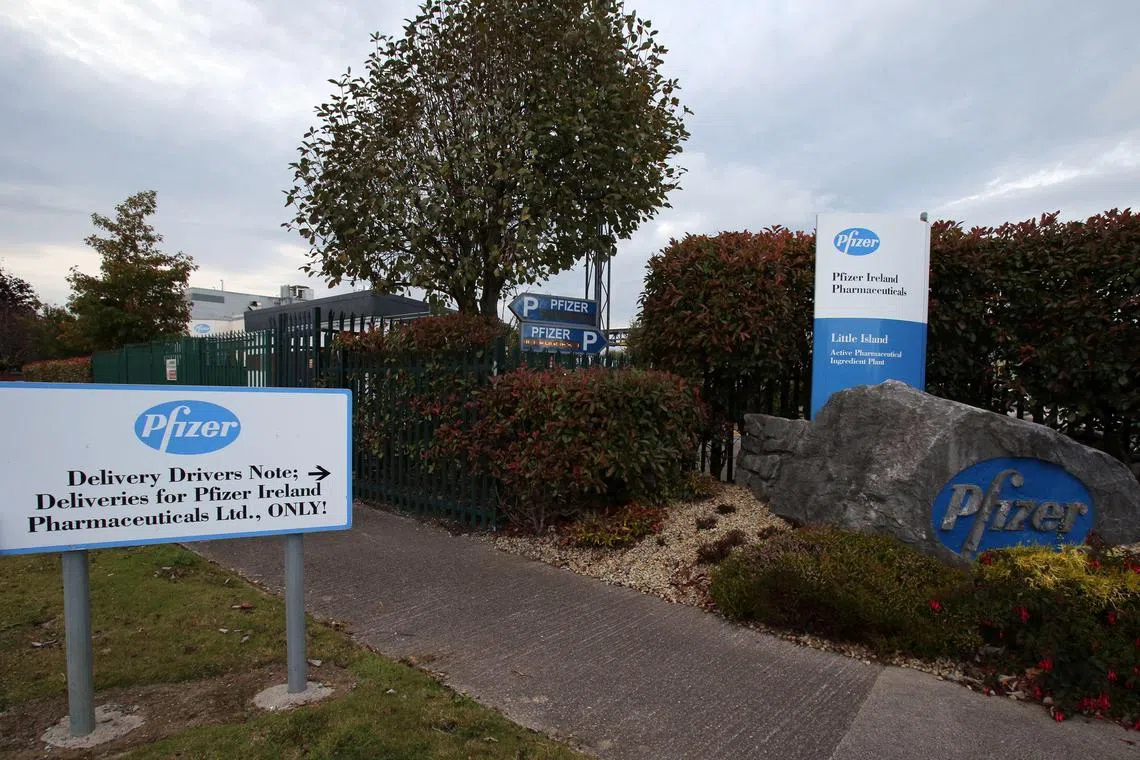Ireland’s ‘economic miracle’ at risk from Trump-EU tariffs
Sign up now: Get ST's newsletters delivered to your inbox

Attracted by low corporate taxes, companies such as Pfizer, Google, Apple and Meta have based their European headquarters in Ireland.
PHOTO: AFP
Follow topic:
- Ireland's economy transformed due to low corporate tax, attracting US multinationals like Pfizer and Apple, fuelling growth and budget surpluses.
- Despite Ireland increasing corporate tax to 15 per cent under OECD pressure, it faces economic risks due to US tariff threats on pharmaceuticals.
- Ireland's GDP contracted due to reduced exports, highlighting its unique integration with the US economy, with potential impacts on jobs and investment.
AI generated
LONDON - The deal between the United States and the European Union may have averted a transatlantic trade war, but worries persist in Ireland where crucial sectors are dependent on US multinationals.
Attracted primarily by low corporate taxes, huge pharmaceutical firms like Pfizer, Eli Lilly, and Johnson & Johnson, and tech giants like Apple, Google, and Meta have based their European headquarters there.
The US investor influx has boosted Irish tax coffers and fuelled record budget surpluses in recent years.
But President Donald Trump’s tariffs – a baseline rate of 15 per cent
Once one of western Europe’s economic laggards, Ireland became known as the “Celtic Tiger” thanks to a remarkable turnaround in the 1990s.
A model built on low corporate tax and an English-speaking workforce in an EU country proved seductive to foreign investors, particularly from the US.
Their presence drove rampant economic growth and would later help Ireland rebound from the financial crash of 2008.
The transition was an “Irish economic miracle,” said business studies professor Louis Brennan, of Trinity College Dublin.
“Ireland has advanced in a matter of decades from being one of the poorest countries of northwestern Europe to being one of the most prosperous,” he told AFP.
In 2024, Ireland hiked its corporate tax rate from 12.5 to 15 per cent after pressure from the Organisation for Economic Co-operation and Development (OECD), but still anticipates a budget surplus of €9.7 billion (S$14.4 billion) for 2025.
Ireland’s “spectacular” transformation “may have been too successful because we are very dependent in many ways on American companies,” said Mr Dan O’Brien, director of the IIEA think-tank in Dublin.
Pharma in front line
Spared from the first round of Mr Trump’s tariffs, pharmaceutical companies are now being targeted by the American administration, keen to repatriate production to home soil.
Earlier this month, the US president threatened a 200 per cent levy on the sector.
Irish Prime Minister Micheal Martin expressed mixed feelings at the July 27 deal of 15 per cent, welcoming that “punitively high tariffs” were avoided.
But “higher tariffs than there have been” will make transatlantic trade “more expensive and more challenging,” he added.
The new 15 per cent levy sealed will be “particularly unwelcome in Ireland,” Mr O’Brien told AFP.
“The pharmaceutical industry is very large relative to the size of the economy, and in recent times around half of its exports have gone to the United States,” he said.

A Pfizer plant on the outskirts of Cork, southern Ireland.
PHOTO: AFP
Pharma employs about 50,000 people and accounted for nearly half of Irish exports in 2024, reaching €100 billion, up by 30 per cent year-on-year.
“Ireland’s problem is that it is uniquely integrated into the United States economy,” said Mr O’Brien.
“There’s no other European country like this. So Ireland is caught in the middle,” he said.
Official data on July 28 showed that Ireland’s economic growth contracted in the second quarter, a consequence of Mr Trump’s tariff threats.
Gross domestic product shrank 1 per cent in the April-June period on reduced exports by multinationals, government figures showed.
It had expanded 7.4 per cent in the first quarter as companies ramped up exports to the United States in anticipation of Mr Trump’s tariffs.
Large pharmaceutical companies, particularly American ones, also host certain patents in the country to reduce their tax burden, which then boosts the Irish tax take.
Tariffs “risk strongly discouraging American companies from setting up their future factories in Ireland,” said Prof Brennan.
The US could still decide to impose further tariffs on the sector following an ongoing probe into whether pharmaceutical imports pose a national security problem, he said.
Tech firms with EU bases in Dublin who have also transferred part of their intellectual property rights will not be directly impacted by the imposition of tariffs on physical goods.
The sector is also a “significant area of investment and employment for Ireland, but at least from a US perspective, it seems outside the scope of the tariffs,” said economics professor Seamus Coffey, of University College Cork.
Beyond tariffs, tech could be affected if the US decides to modify its tax regime to make it less attractive to set up in low-tax countries, said Mr Andrew Kenningham, of Capital Economics. AFP

